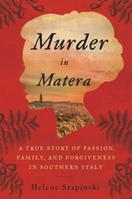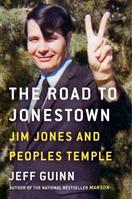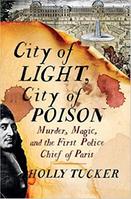For a while, all my friends seemed to be obsessed with S-Town, the new podcast by the creators of Serial and This American Life. In it, host Brian Reed probes suspicious behavior in an Alabama town after a resident begs him to investigate an outrageous murder. It's just a bad town, he's told, and bad things happen in bad towns.  Like Reed, Helene Stapinski faces the question of criminal inevitability in Murder in Matera (Dey Street, $26.99). For her, though, it runs much deeper. A family legend has been passed down for generations about her great-great-grandmother: "Vita was a murderess. She took a life and ran." Her ancestor's violence and loose morals may yet reside in Stapinski's DNA, she's cautioned, and one day she or her children may succumb to such passions. To uncover the truth about Vita, Stapinski departs Brooklyn for the Italian province where it all went down.
Like Reed, Helene Stapinski faces the question of criminal inevitability in Murder in Matera (Dey Street, $26.99). For her, though, it runs much deeper. A family legend has been passed down for generations about her great-great-grandmother: "Vita was a murderess. She took a life and ran." Her ancestor's violence and loose morals may yet reside in Stapinski's DNA, she's cautioned, and one day she or her children may succumb to such passions. To uncover the truth about Vita, Stapinski departs Brooklyn for the Italian province where it all went down.  The question of bad seeds arises repeatedly in true crime, because usually the offense is so horrific we can't imagine how it could happen otherwise. That's what makes the Jim Jones biography The Road to Jonestown (Simon & Schuster, $28) so enthralling. Jeff Guinn reveals how an ambitious young integrationist became a murderous demagogue.
The question of bad seeds arises repeatedly in true crime, because usually the offense is so horrific we can't imagine how it could happen otherwise. That's what makes the Jim Jones biography The Road to Jonestown (Simon & Schuster, $28) so enthralling. Jeff Guinn reveals how an ambitious young integrationist became a murderous demagogue. Likewise, environment can have just as much influence on criminal potential, as Holly Tucker illustrates in City of Light, City of Poison (Norton, $26.95). The Parisian court of King Louis XIV was rife with murder, sex and magic--mysteries the first police chief, Nicolas de la Reynie, was determined to solve, no matter how cruel the interrogation technique.
Likewise, environment can have just as much influence on criminal potential, as Holly Tucker illustrates in City of Light, City of Poison (Norton, $26.95). The Parisian court of King Louis XIV was rife with murder, sex and magic--mysteries the first police chief, Nicolas de la Reynie, was determined to solve, no matter how cruel the interrogation technique.
I hate waiting for new podcast episodes week by week; I get so caught up in the intrigue. With books, too, I can't seem to turn pages fast enough. But heaven forbid the plot gets spoiled. That would be a real crime. --Dave Wheeler, associate editor, Shelf Awareness

